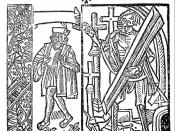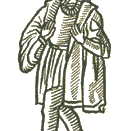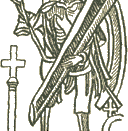The Quest For Death
The medieval fascination regarding the Quest for Death is evident in morality plays. The typical morality play is a 'psychomachia, an externalized dramatization of a psychological and spiritual conflict: the battle between the forces of good and evil in salvation, despite the obstacles and temptations that he encounters as he travels through life, toward death' (Blue 2). The moralities dramatized the progress experienced by Christians as they moved through life, towards death. Beginning at birth with innocence, moving into sin, and before death, repetance and then salvation. In morality plays 'the forces of Evil (the Seven Deadly Sins, the World, the Flesh, the Devil, Vice) are arrayed against the Christian, who turns for help to the forces of Good (God, His Angels, Virtue)' (Blue 3). The morality play presents Biblical stories with a strong emphasis on religious purpose, didactic meanings, and above all Christianity ("A Morality Play"). Its specific intent was to instruct audiences in the Christian way of life and attitudes towards death. 'The general theme of the morality play is the conflict between good and evil for the human soul; the play always end with the saving of the soul. The characters of the morality play are not the saints or biblical personages of the miracle play, but personifications of such abstractions as flesh, gluttony, lechery, sloth, pride, envy, hope, charity, riches, and strength' (Casev12 3). The morality play is a play 'enforcing a moral truth or lessen by means of the speech and action of characters which are personafied abstractions - figures representing vices and virtues, qualities of the human mind, or abstract conceptions in general' ("Moralities"). 'The morality play was an allegory that depicted the fall of a representative Everyman, his life in sin and folly, and his eventual redemption.


